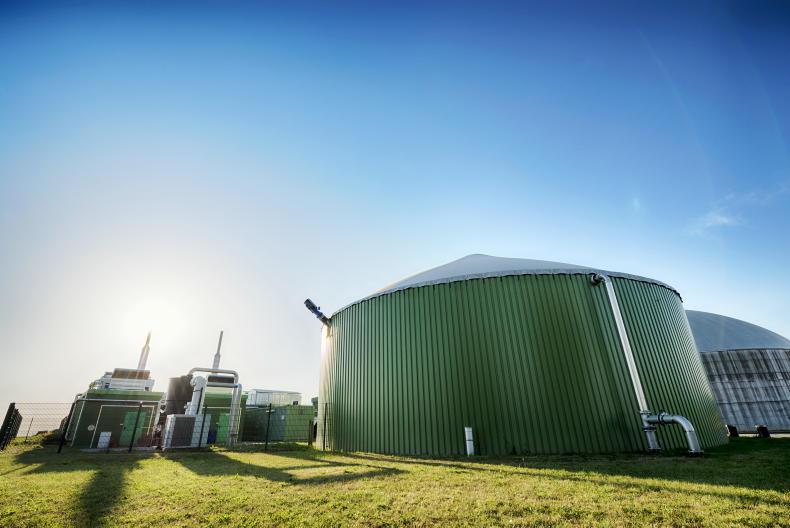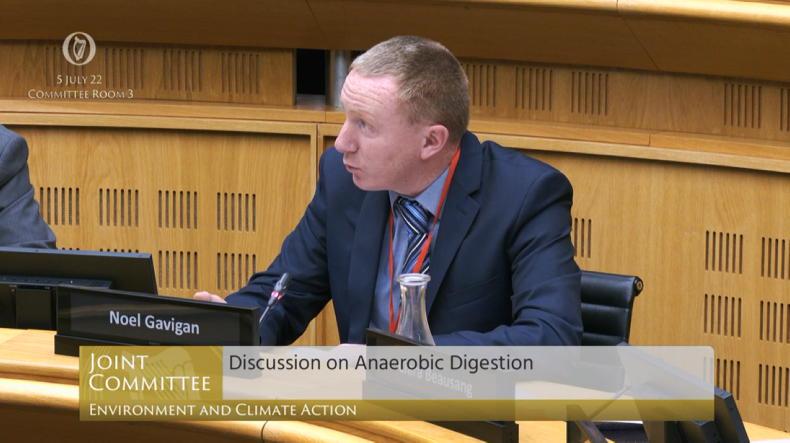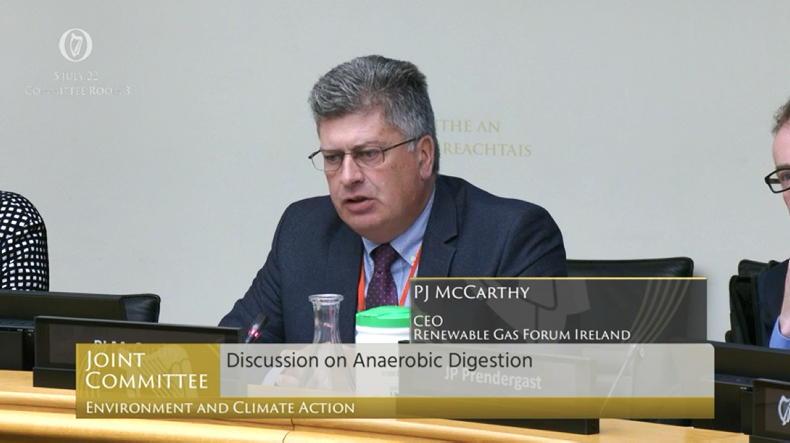Biomethane generated by farmers through anaerobic digestion (AD) has the “potential to replace natural gas [used in Ireland] in a way that is technically feasible and commercially viable”, according to the Renewable Gas Forum Ireland (RGFI).
RGFI CEO PJ McCarthy said that such ambition requires “appropriate Government policy and legislative supports”. He was speaking to the Oireachtas Environment Committee on Tuesday.
Biomethane is a carbon-neutral renewable gas made from farm and food waste through a process known as anaerobic digestion.
Climate-neutral farming
The RGFI lead said AD biomethane could reduce carbon emissions in Ireland by 700,000t per annum, capture carbon in soil and improve biodiversity, air and water quality by reducing nitrates run-off.
He described this, and the income farmers can generate through AD, as a “central enabler to climate-neutral farming” and highlighted the economic benefits to be gained for rural Ireland.
McCarthy also said an AD biomethane sector is “projected to create 3,000 sustainable jobs across rural Ireland”.
His comments were backed by Fianna Fáil TD Christopher O’Sullivan, who is tabling a legislative bill to force Minister for the Environment and Climate Eamon Ryan to develop a policy strategy for the sector.
O’Sullivan said AD biomethane is “something which needs to be part of the sector and needs to be rolled out at a greater scale”.
Alignment
PJ McCarthy said that expansion of Ireland's AD biomethane sector “aligns with the Paris [Climate] Agreement, EU Green Deal, Farm to Fork Strategy, national agricultural and climate action strategies”.
He called on Government to “socialise the cost of biomethane production” through the introduction of a renewable heat obligation (RHO) scheme.
The RHO is aimed at incentivising the use of renewable heat, while spreading the obligation across all non-renewable fuel types.
This will spread the cost impact over all consumers of non-renewable fuels and does not place the financial burden on one particular sub-sector or area, according to Government.
McCarthy pointed out that a commitment on the RHO is included in the Climate Action Plan 2021, but warned that “time is of the essence” and said Government must introduce it “as soon as possible”.
It’s understood the RHO would incentivise and support investment in AD biomethane production.
The RGFI CEO also called on Government to deliver capital funding supports to establish the sustainable agricultural feedstock AD plants and said the “industry is ready, willing and able to play its part” in “support of the transition to carbon neutrality”.
Increasing farm sustainability
Irish Farmers' Association (IFA) president Tim Cullinan also shared the farm association’s views on AD biomethane at the meeting on Tuesday.
“The energy produced can be used on the farm, while excess electricity or heat can be exported to provide additional revenue, increasing the sustainability of the farm business and reducing on-farm emissions,” he said.

TDs were told that biomethane generation has the potential to create 3,000 sustainable jobs across rural Ireland.
He said biomethane produced by farmers can be “injected into the natural gas network or compressed into containers for use as a fuel in other applications, such as road transport” and that the production of biogas is the only “fully dispatchable renewable energy that can assist in addressing our electricity, heat and transport renewable energy targets”.
Cullinan called on Government to develop a national biomethane strategy backed by funding, so farmers have confidence to invest in AD and, similarly to RGFI, said an RHO scheme with “attractive subsidies” is required “as soon as possible” to support the wide-scale deployment of AD production.
The Tipperary farmer suggested that Government “streamline current regulations to support the development of AD plants”, particularly small-scale plants on farms.
Managing farm wastes
Noel Gavigan, an executive at the Irish BioEnergy Association (IrBEA), said that biomethane production has a role in managing “on-farm wastes such as slurry and farmyard manure” and that this allows the farm to “efficiently recycle valuable nutrients, as well as recovering energy for farm use”.

Irish BioEnergy Association (IrBEA) execuitve Noel Gavigan joined the Oireachtas Environment Committee on Tuesday.
“Ammonia emissions can be reduced, with the added benefit of providing more nitrogen for farm use. On-farm digestion offers an in-house method to decarbonise the farm while maintaining current food production,” he said.
However, he suggested that “like any new development, there is a need for public awareness on the benefits of the technology”.
“We see European examples of biogas plants located next to residential areas in villages with no issues arising. In Ireland, we have seen some biogas plants welcomed by the public and others meeting sustained objection based on local opposition.
“There is a need for local government to better understand the benefits of biogas and be able to support positive developments of these vital technologies,” he said.
Biomethane generated by farmers through anaerobic digestion (AD) has the “potential to replace natural gas [used in Ireland] in a way that is technically feasible and commercially viable”, according to the Renewable Gas Forum Ireland (RGFI).
RGFI CEO PJ McCarthy said that such ambition requires “appropriate Government policy and legislative supports”. He was speaking to the Oireachtas Environment Committee on Tuesday.
Biomethane is a carbon-neutral renewable gas made from farm and food waste through a process known as anaerobic digestion.
Climate-neutral farming
The RGFI lead said AD biomethane could reduce carbon emissions in Ireland by 700,000t per annum, capture carbon in soil and improve biodiversity, air and water quality by reducing nitrates run-off.
He described this, and the income farmers can generate through AD, as a “central enabler to climate-neutral farming” and highlighted the economic benefits to be gained for rural Ireland.
McCarthy also said an AD biomethane sector is “projected to create 3,000 sustainable jobs across rural Ireland”.
His comments were backed by Fianna Fáil TD Christopher O’Sullivan, who is tabling a legislative bill to force Minister for the Environment and Climate Eamon Ryan to develop a policy strategy for the sector.
O’Sullivan said AD biomethane is “something which needs to be part of the sector and needs to be rolled out at a greater scale”.
Alignment
PJ McCarthy said that expansion of Ireland's AD biomethane sector “aligns with the Paris [Climate] Agreement, EU Green Deal, Farm to Fork Strategy, national agricultural and climate action strategies”.
He called on Government to “socialise the cost of biomethane production” through the introduction of a renewable heat obligation (RHO) scheme.
The RHO is aimed at incentivising the use of renewable heat, while spreading the obligation across all non-renewable fuel types.
This will spread the cost impact over all consumers of non-renewable fuels and does not place the financial burden on one particular sub-sector or area, according to Government.
McCarthy pointed out that a commitment on the RHO is included in the Climate Action Plan 2021, but warned that “time is of the essence” and said Government must introduce it “as soon as possible”.
It’s understood the RHO would incentivise and support investment in AD biomethane production.
The RGFI CEO also called on Government to deliver capital funding supports to establish the sustainable agricultural feedstock AD plants and said the “industry is ready, willing and able to play its part” in “support of the transition to carbon neutrality”.
Increasing farm sustainability
Irish Farmers' Association (IFA) president Tim Cullinan also shared the farm association’s views on AD biomethane at the meeting on Tuesday.
“The energy produced can be used on the farm, while excess electricity or heat can be exported to provide additional revenue, increasing the sustainability of the farm business and reducing on-farm emissions,” he said.

TDs were told that biomethane generation has the potential to create 3,000 sustainable jobs across rural Ireland.
He said biomethane produced by farmers can be “injected into the natural gas network or compressed into containers for use as a fuel in other applications, such as road transport” and that the production of biogas is the only “fully dispatchable renewable energy that can assist in addressing our electricity, heat and transport renewable energy targets”.
Cullinan called on Government to develop a national biomethane strategy backed by funding, so farmers have confidence to invest in AD and, similarly to RGFI, said an RHO scheme with “attractive subsidies” is required “as soon as possible” to support the wide-scale deployment of AD production.
The Tipperary farmer suggested that Government “streamline current regulations to support the development of AD plants”, particularly small-scale plants on farms.
Managing farm wastes
Noel Gavigan, an executive at the Irish BioEnergy Association (IrBEA), said that biomethane production has a role in managing “on-farm wastes such as slurry and farmyard manure” and that this allows the farm to “efficiently recycle valuable nutrients, as well as recovering energy for farm use”.

Irish BioEnergy Association (IrBEA) execuitve Noel Gavigan joined the Oireachtas Environment Committee on Tuesday.
“Ammonia emissions can be reduced, with the added benefit of providing more nitrogen for farm use. On-farm digestion offers an in-house method to decarbonise the farm while maintaining current food production,” he said.
However, he suggested that “like any new development, there is a need for public awareness on the benefits of the technology”.
“We see European examples of biogas plants located next to residential areas in villages with no issues arising. In Ireland, we have seen some biogas plants welcomed by the public and others meeting sustained objection based on local opposition.
“There is a need for local government to better understand the benefits of biogas and be able to support positive developments of these vital technologies,” he said.








 This is a subscriber-only article
This is a subscriber-only article










SHARING OPTIONS: